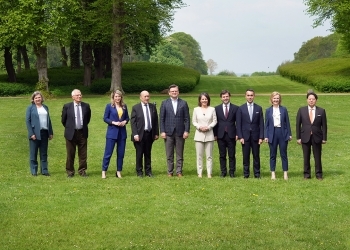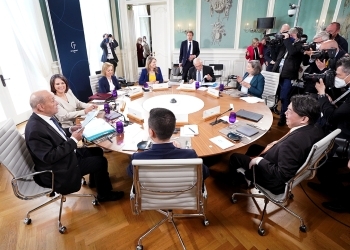G7/G8
G7 Foreign Ministers' Meeting


From May 12 to 14, the G7 Foreign Ministers' Meeting was held in Weissenhaus, Germany. The overview of the meeting is as follows. The meeting was attended by the Foreign Ministers of the G7 countries, including Mr. HAYASHI Yoshimasa, Minister for Foreign Affairs of Japan (*Antony Blinken, Secretary of State of the United States of America was absent) and the EU High Representative of the European Union for Foreign Affairs and Security Policy. Six extraordinary foreign ministers’ meetings have already been held this year, and this was the seventh. This meeting, which had been scheduled since the beginning of the year, was a three-day in-depth exchange of views among the G7 foreign ministers, mainly on the situation in Ukraine and the Indo-Pacific. The following outcome documents were issued throughout the meeting.






1. Russia and Ukraine
A. Outline
Minister Hayashi reiterated his condemnation of Russia's aggression against Ukraine. He stressed that the use or threat of nuclear weapons must never be tolerated and that it is essential to maintain and strengthen the international nuclear disarmament and non-proliferation regime and called for cooperation among the G7. He also stated the importance of careful outreach to other countries, accounting for Asian perspectives.
As part of the G7, Japan reaffirmed its continued support for Ukraine and its determination to increase economic and political pressure on Russia, including further sanctions. The ministers shared the view to cooperate with countries that have been economically affected by Russia's aggression against Ukraine and to support them as part of the G7.
B. Assistance to Ukraine and neighboring countries
H.E. Mr. Dmytro KULEBA, Minister for Foreign Affairs of Ukraine, and H.E. Dr. Nicu POPESCU, Deputy Prime Minister and Minister of Foreign Affairs and European Integration of the Republic of Moldova participated in some sessions. They expressed their gratitude for the G7's support and called for continued assistance. The G7 reaffirmed its commitment to support Ukraine, including economic, financial, and defense assistance, continued humanitarian assistance, and reconstruction. The G7 praised the acceptance of displaced persons by neighboring countries and announced support for addressing both short- and long-term issues.
Minister Hayashi stated that Japan would steadily implement the humanitarian and financial assistance already decided upon in relation to neighboring countries, including Ukraine and Moldova, and would continue to consider necessary assistance.
C. The international impact of Russia’s aggression, including food and energy security
Minister Hayashi stated the importance of substantive support and cooperation for countries affected by Russian aggression. He called for G7 collaboration in addressing food and other issues. The G7 shared the resolution to support efforts to ensure access to food and energy for all people amid soaring food prices and growing humanitarian needs.
H.E. Ms. Retno L.P. Marsudi, Minister of Foreign Affairs of the Republic of Indonesia (G20 Presidency), participated online. The G7 and Indonesia reaffirmed to continue to work closely on food and energy issues and shared the view on the importance of upholding principles such as sovereignty, territorial integrity, and the rule of law.
2. China, North Korea, Indo-Pacific (Note: Minister Hayashi led the discussion as the lead speaker)
Minister Hayashi raised serious concerns and opposition to continued and strengthened unilateral attempts to change the status quo in the East China Sea and South China Sea, and the importance of peace and stability in the Taiwan Strait. He called for continued cooperation among the G7. The G7 countries expressed concern about various issues concerning China.
Minister Hayashi stated that North Korea's increased nuclear and missile activities, including its ICBM launch in March and ballistic missile launch on May 12, are a clear and serious challenge to the international community. He also stated that it is increasingly important for the international community to take resolute action toward the implementation of CVID for all North Korean weapons of mass destruction and ballistic missiles. He expressed expectations for closer collaboration among the G7 countries. The G7 countries expressed concern over North Korea's nuclear and missile development and called for close G7 cooperation, and shared the view to reiterate their call for CVID for all North Korean weapons of mass destruction and ballistic missiles. In addition, Minister Hayashi called for full understanding and cooperation toward an immediate resolution of the abduction issue and received support from all countries.
Regarding Myanmar, Minister Hayashi stated that it is important to support ASEAN's efforts to implement the “ASEAN Five Point Consensus.” He stated that Japan would continue to work with international organizations and ASEAN to provide continued humanitarian assistance to the people of Myanmar, and urge the Myanmar Armed Forces to allow safe and unhindered humanitarian access. The G7 shared the view to support the efforts of ASEAN and the Special Envoy of the ASEAN Chair for a peaceful resolution.
3. Middle East, North Africa, and Sub-Saharan Africa
The G7 exchanged views on the status of negotiations on the return to the Iran nuclear agreement (JCPOA), the political situation in Libya, engagement with the Taliban, regional cooperation on Afghanistan, etc. The G7 affirmed that they would continue to work together on various issues in the Middle East and North Africa.
The G7 also discussed the impact of the situation in Ukraine on Africa and enhancing the G7-Africa partnership (including security aspects), and regional situations in the Sahel, Ethiopia, etc. The G7 shared the view to enhance outreach to Africa and continue support for Africa in the face of difficult circumstances.
4. Pandemic and Infrastructure Development (*U.S. Secretary Blinken participated by phone)
The G7 shared the view to enhance cooperation to support the correction of vaccine disparities and to prepare for future pandemics. Minister Hayashi expressed Japan's intention to provide up to US$100 million, primarily in the Indo-Pacific region, in support for vaccination data management, border control systems, and infectious waste disposal to revitalize the economies and societies of developing countries and resume cross-border travel.
The G7 shared the view to enhance international standards related to quality infrastructure investment. The G7 called on all countries concerned to comply with these standards, with the shared goal of closing the gap in infrastructure investment, particularly in Africa and the Indo-Pacific.
5. Climate crisis
The G7 discussed the security implications of climate change and environmental degradation. The G7 reaffirmed its support for countries and regions most affected by security impacts of climate and environment-related risks. Minister Hayashi expressed his willingness to contribute to the discussion on climate from the perspective of human security, while taking advantage of the opportunity of the 8th Tokyo International Conference on African Development (TICAD8) to be held this year.

